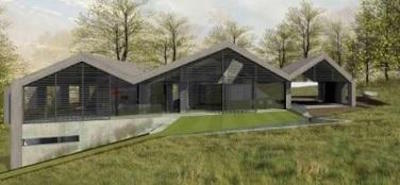
Another example of the obstacles facing Brits who want to live off-grid – plans for a home that would run entirely on its own electricity and water are set to be refused by Braintree County Council, a notoriously backward looking area of southern England
Peter and Janine Schwier, bought a plot of land in Great Maplestead, their first mistake – since local villagers oppose any new properties being built out of fear it will encourage other new properties to be built.
They wish to build a house described as an ‘off-grid’ Passivhaus, meaning it is self-sufficient and capable of generating its own electricity, heat and water.
Great Maplestead Parish Council – which includes a number of what we believe to be wealthy bigots – objected to the application, saying the village was not sustainable for development.
Braintree Council planning officers have recommended to refuse planning permission, as residents were against further development.
However there was some support for the application, with residents saying the area lacks modern efficient homes, and this one would take advantage of all technology.
The unique house would also include the use of electric cars.
In a planning statement, the agent Green Architect said: “(The applicants) are concerned about the environment, pragmatic about climate change
and wish to live in a dwelling that is totally self sufficient, one that is capable of generating all its own electricity, heat and water from within the site,
disposing of all their waste within the site and providing all the power necessary, with the option to run their cars from within the site.
“The proposal includes the use of electric cars and bicycles powered solely by the sun and space for home working.
“In addition it is close to excellent employment opportunities in Sible Hedingham and Halstead and the village has super-fast broadband which supports home working and wellbeing.”
Planning officers said although charging points for electric cars could be included, it would not be reasonable to require future homeowners to only use electric cars.
They said: “Cycling could be an option for some future residents, but not all, depending on mobility and proficiency thus reducing the reliance that can be placed on this mode of transport as an alternative to a private car.
“Although the proposal should be commended for including such sustainable features, as it is not possible to control the provision of these through the planning process, they carry little weight in favour of the development.”
Braintree councillors will have the final say at a Planning Committee meeting on January 10.